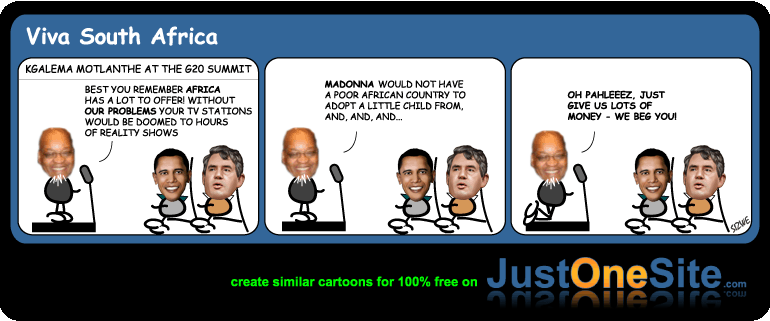Kgalema Motlanthe was the token African at the recent G20 summit. With not much to offer in terms of negotiating power, whatever he asked for was tantamount to straightforward begging from the rich.
With domestic crises taking a priority for global leaders, they can hardly be blamed for maintaining a focus on their home-based issues. Still some positive noises were made to appease the poor of the world. How it translates into concrete benefit for the developing world through the life of the global crisis however remains to be seen. Given the circumstances, Wonkie thinks it is likely that rich countries will continue to implement more protectionist measures in the short-medium term.
As an aside, Wonkie is always amazed at the number of people that knock globalisation when the markets turn sour but are the first in line to capture the fruits of it when times are good. We would be happy to wager that at least half the anti-globalisation t-shirts sold in London over the last week were imported from some dingy Chinese sweatshop from across the seas.




 (14 raters, Click a star a star to rate this article)
(14 raters, Click a star a star to rate this article) .
.








Nice Site layout for your blog. I am looking forward to reading more from you.
Tom Humes
Wonkie, I have a probelm. The problem is, I have nothing against rich nations getting progressively more protectionist, protecting their own wealth and people. Worse, I’m not really sure how much rich nations or rich individuals owe the poor.
As for globalisation, I can’t help feeling that negativity can be expected when something isn’t working. Nevertheless, I take your point. Semaj.
Semaj, Wonkie sees no problem at all with your observation and to some extent agrees with it. A few important points though:
1. Protectionism as proven in the last century with, for example, the steel industry in the US, actually plays out well as populist economic policy. However history has shown that these measures cost the country implementing the policies more – both in terms of long term employment and wealth creation than had those policies not been implemented and the market remained competitive. The argument for us is more for the richer nations not to get sidelined by policies that increase local popularity and confidence, but rather to focus on those policies together with their trading partners that secure the quickest possible recovery for the system as a whole – even if this means slightly more short term pain.
2. From a purely capitalist perspective, rich nations do not owe the poor. The US and other economic powerhouses worked hard to get where they are and Wonkie can see your point of view. The concept of moral responsibility however is a tricky one and lies outside the scope of the pure capitalism debate. The argument is if the rich countries manipulated and abused resources (be it raw materials, minerals, or even labour) belonging to poor countries to enrich themselves in the first place, surely they owe something to those countries – particularly if they used those resources in a non-sustainable way leaving those countries worse off in the long run?
Wrong head dude, I know they look alike one bald (zuma) other not (Kgalema)
Thabo – it’s definitely the right head dude!
Think you missed out on our cartoon post last year on the topic (which was incidently runner up for the best post on a South African blog in 2008 at the SA Blog Awards last week!) – check out the Bring me the head of Kgalema Motlanthe cartoon